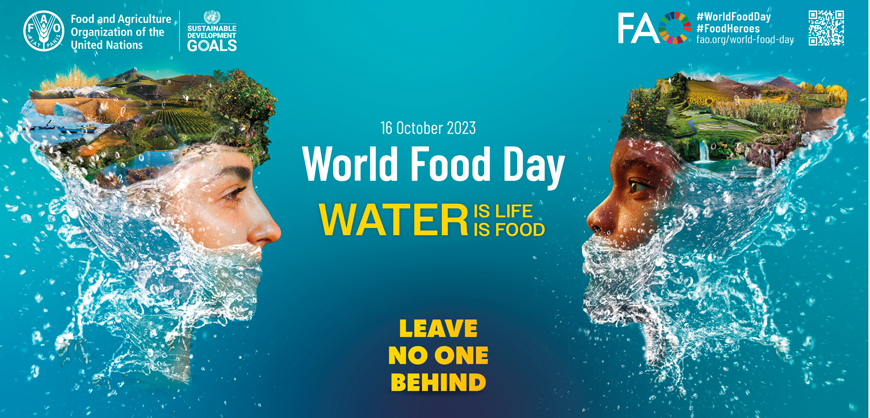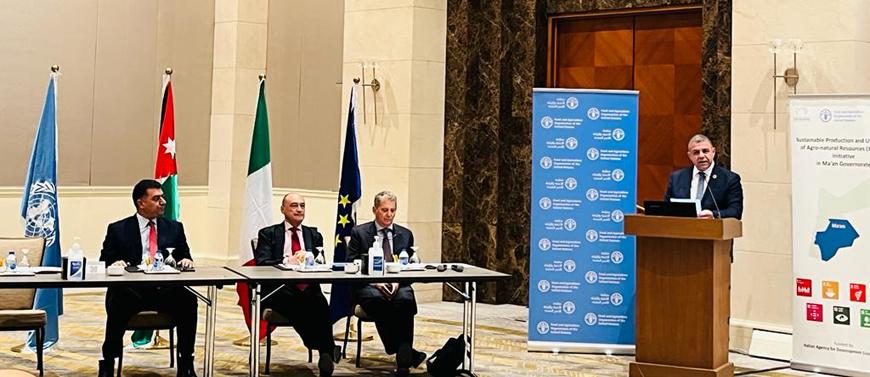You are here
‘Water is life, water is food’: World Food Day celebrates precious resource
By JT - Oct 16,2023 - Last updated at Oct 16,2023

Image courtesy of FAO
AMMAN — World Food Day is celebrated globally on October 16 to mark the founding date of the Food and Agriculture Organization of the United Nations (FAO). This key international day is celebrated by governments, local authorities, and partners in over 150 countries across the world. In Jordan, it is celebrated under the Patronage of HRH Princess Basma Bint Talal.
The theme of this year’s World Food Day is “Water is life, water is food. Leave no one behind”. It communicates a relevant message to the people and all key players to work together to manage a finite, precious resource: Water, said a FAO statement.
Water is essential to life on Earth. It makes up over 50 per cent of our bodies and covers about 71 per cent of the Earth’s surface. Only 2.5 per cent of water is fresh, suitable for drinking, agriculture, and most industrial uses. Water is a driving force for people, economies and nature and the foundation of our food. Indeed, agriculture accounts for 72 per cent of global freshwater withdrawals, but like all natural resources, fresh water is not infinite.
Rapid population growth, urbanisation, economic development, and climate change are putting the planet’s water resources under increasing stress. At the same time, freshwater resources per person have declined 20 per cent in the past decades and water availability and quality are deteriorating fast due to decades of poor use and management, over extraction of groundwater, pollution and climate change. “We risk stretching this precious resource to a point of no return,” the statement said.
Today, 2.4 billion people live in water-stressed countries. Many are smallholder farmers who already struggle to meet their daily needs, particularly women, migrants, and refugees. Competition for this priceless resource is increasing as water scarcity becomes an ever-increasing cause of conflict.
Jordan is facing severe climate change risks and business as usual will no longer suffice in addressing the challenges the country faces to its development and growth. Jordan is one of the most water scarce countries in the world and climate change is further exacerbating aridity due to increasing temperatures and reduced/more erratic rainfall patterns coupled with an unprecedented population increase due to both natural growth and refugee influx.
In this context, FAO Jordan offers advanced technologies which play an important role in agriculture development and in water resources sustainable management. One example of the advanced technology is called WaPOR, FAO opens an access portal that provides users with a wide variety of information that could be used to monitor and manage water uses in agriculture and to improve water productivity. WaPOR can be also used in many applications to support decisions related to water and agriculture management.
Furthermore, FAO in Jordan has started the implementation of “Building resilience to cope with climate change in Jordan through improving water use efficiency in the agriculture sector (BRCCJ)”. The project will support the objectives of Jordan’s climate change policy by building the adaptive capacity of communities and institutions, addressing the needs of vulnerable groups, and increasing the resilience of water management systems as well as that of the agricultural sector to climate change.
This project is expected to achieve 3 per cent to 3.5 per cent reduction in groundwater overdraft and achieve cumulative water savings estimated at approximately 1.83 million cubic metres (mcm) over a 10-year period. In addition, 10,600 hectares of agricultural land area will be made more resilient through climate-adaptive measures, such as the use of alternative sources of sustainable water (i.e.reclaimed water) and new practices of agricultural management to deal with water related stresses.
FAO’s interventions in Jordan are fully aligned with the government’s national strategies and plans and to the Economic, Political and Public Sector Modernisation reforms2022-2033. It also falls within the UNSDCF forth strategic priority: All people in Jordan to have equitable, affordable, sufficient, safe, sustainable and reliable access to water, food and energy.
Moreover, this year’s World Food Day comes as FAO turns 78. FAO was founded on October 16, 1945 to expand agricultural knowledge and nutritional wellbeing. And over the past 78 years of existence, with more than 194 member states and working in over 130 countries worldwide, FAO has grown, nourished and sustained the gifts of our soils, the livelihoods of our people, and the legacy of our planet.
“It’s time to start managing water wisely. We need to produce more food and other essential agricultural commodities with less water, while ensuring water is distributed equally, our aquatic food systems are preserved, and nobody is left behind,” read the statement.
“But this precious resource is not infinite, and we need to stop taking it for granted. What we eat, and how that food is produced all affect water.”
Related Articles
AMMAN — The Food and Agricultural Organisation (FAO) of the United Nations, in coordination with the IHE Delft Institute for Water Education
AMMAN — The Government of Italy and the Food and Agriculture Organisation of the United Nations (FAO), in cooperation with the Ministry of A
AMMAN — The National Agricultural Research Centre (NARC) and the Office of the Food and Agriculture Organisation of the United Nations (FAO)















